MercoPress. South Atlantic News Agency
Tag: Falklands sovereignty
-
Monday, July 1st 2024 - 08:44 UTC
Lord Ahmad, “The UK has no doubt about Falkland Islanders right to self determination”
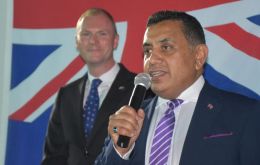
Lord Ahmad, UK Minister of State for the Middle East, North Africa, South Asia, Commonwealth, and United Nations, addressed the 54th regular session of the OAS general assembly in Asunción, Paraguay.
-
Saturday, June 29th 2024 - 10:55 UTC
OAS General Assembly salutes Argentina's stance regarding Malvinas and issues Declaration of Asunción
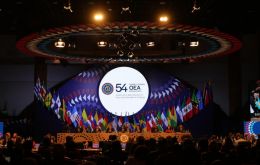
The 54th General Assembly of the Organization of American States (OAS) concluded Friday in the Paraguayan capital with the Declaration of Asunción, a document promoting the elimination of violence against women and girls, the fight against climate change, and the fight against organized crime.
-
Wednesday, June 19th 2024 - 10:59 UTC
Falklands tells Decolonization Committee C24, “Our voice is all that matters”

By MLA Teslyn Barkman
The Falklands people are not the UK officials that have administered the Islands. However, Argentina don’t accept this, and requested again to be our colonial masters at the UN C24-decolonisation committee. MLA Short and I attended the UN meeting of the “question of the Falklands” on Tuesday 18th June to point to the obvious - Our voice is all that matters. -
Wednesday, June 19th 2024 - 10:57 UTC
“Requesting UK and Argentina talk bilaterally about Falklands future is entirely colonial,” MLA Teslyn Barkman
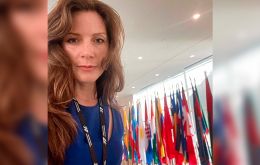
A group of elected assembly members from the Falkland Islands presented an address to the United Nations Special Committee on the situation regarding the implementation of the declaration on the granting of independence to colonial countries and peoples.
-
Monday, April 29th 2024 - 14:45 UTC
Negotiations for a Falklands third humanitarian project confirmed by UK ambassador in Argentina

Kirsty Hayes, British ambassador in Buenos Aires admitted that relations between Argentina and UK have been “complex”, and London has always made efforts to improve them, but ”there will be no sovereignty discussions on Falklands' sovereignty because what is most important is not our (British) perception or that of Argentina but the Falkland Islanders opinion.”
-
Monday, April 15th 2024 - 21:15 UTC
A book, a hymn and the “Malvinization” of the Argentine society

How was it possible that when the Argentine military government in 1982 decided to militarily recover and occupy by force the Malvinas Islands it managed such almost unanimous support from the Argentine society? All political parties, Peronism, the Radicals, and the powerful labor union organization, CGT, which only a few days before had organized a strike against the military government, all of them had openly supported the takeover action by force in the Islands. Even groups persecuted by the military government, and exiled groups from overseas expressed support for the military recovery. Firmenich an Argentine notorious terrorist undergoing guerrilla training in Havana, Cuba, pledged that the terrorist Montoneros group would attend the meeting in Plaza de Mayo to oppose the English aggression, and even the Mothers of Plaza de Mayo, which did not support the military government had to “Malvinize” their speech, “the Malvinas are Argentine, and so are the disappeared”. In other words, they had to 'Malvinize” the universal human right.
-
Tuesday, April 9th 2024 - 10:04 UTC
Milei pledges to “recover the Malvinas Islands” through diplomatic means
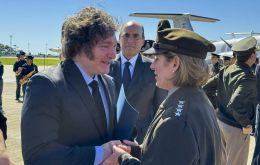
Argentine President Javier Milei insisted Monday that he intends to recover the Falkland/Malvinas Islands through diplomatic means but admitted it would be “a long process.”
-
Wednesday, April 3rd 2024 - 10:32 UTC
Milei pledges to obtain a roadmap for the return of Malvinas during his mandate
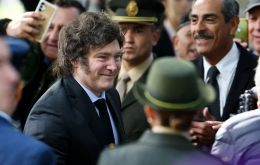
On the 42nd anniversary of the start of the Falklands/Malvinas war, President Javier Milei pledged that during his term in office “we will have a roadmap so that the Malvinas Islands return to Argentine hands,” underlining that the South Atlantic Islands sovereignty claim is an includible mandate for all Argentines, but for this we need “a country with a vigorous and prosperous economy” and that respects its armed forces.
-
Wednesday, February 28th 2024 - 23:28 UTC
Argentina adapts strategy on Falklands/Malvinas sovereignty claim: “There is no discussion”
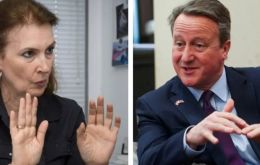
Argentina's strategy on its sovereignty claim over the Falkland/Malvinas Islands “has changed,” Chancellor Diana Mondino said after meeting with British Foreign Secretary David Cameron.
-
Thursday, February 22nd 2024 - 11:40 UTC
Mondino tells Cameron Argentine not happy with his trip to Falklands

Argentine Foreign Minister Diana Mondino Wednesday conveyed to her British colleague Lord David Cameron her government's uneasiness for the latter's visit to the Falkland Islands en route to the G20 Summit of top diplomats where they met. Mondino also insisted on Argentina's “sovereignty rights” over the archipelago during their one-on-one encounter on the sides of the G-20 convention.
